|
|
|
Sort Order |
|
|
|
Items / Page
|
|
|
|
|
|
|
| Srl | Item |
| 1 |
ID:
119963
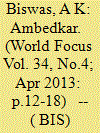

|
|
|
| 2 |
ID:
087479
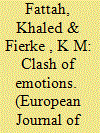

|
|
|
|
|
| Publication |
2009.
|
| Summary/Abstract |
After the attacks of 9/11 Americans asked, `Why do they hate us so much?' The answer has been framed in terms of a range of `clashes', none of which has addressed emotion, which is at the centre of the question. Emotion, and particularly humiliation, has begun to be addressed within the literature of IR. Numerous scholars have highlighted the pervasiveness of a discourse of humiliation in the Middle East and its relationship to the swelling ranks of recruits who are willing to act as human bombs. The purpose of this article is to examine the emotional dynamics of this relationship. The first section undertakes a conceptual analysis of humiliation and betrayal. The second section explores how these emotions have been given coherent meaning in the narrative of Islamists from the region. This is followed by an historical analysis of how this narrative has provided a framework for giving meaning to a range of national, regional and international interactions, particularly since 1967, and has contributed to the emergence of Islam as the basis for transnational identity in what had become a highly secular region. Section three examines flaws in the logic of both militant Islamists and the US-led `War on Terrorism', arguing that both have exacerbated feelings of humiliation in the region rather than contributing to a restoration of dignity. The conclusion builds on the principle of human dignity to rethink the international approach to political violence.
|
|
|
|
|
|
|
|
|
|
|
|
|
|
|
|
| 3 |
ID:
165937
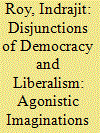

|
|
|
|
|
| Summary/Abstract |
In this paper, I make a case for appreciating the ‘agonistics of democracy’ by reflecting on political changes in the state of Bihar in eastern India since 1990. These changes compel us to appreciate the substantive deepening of democracy in Bihar despite the absence of values commonly associated with liberalism. I first highlight the emergence of ‘Backward Caste’ assertion in the state, which sought to construct the broadest possible alliance against the so-called ‘Forward Castes’ and culminated in the ascendancy of the Janata Dal government of Lalu Prasad Yadav in 1990. I next point to the inchoate antagonism harboured by poor people against the privileged who seek to assert their caste supremacy. Describing the vocabularies of dignity in which such supremacy is contested, I demonstrate that conflict is entwined with co-operation in poor people’s quotidian engagements with the privileged classes. In conclusion, I argue that an ‘agonistics of democracy’ allows us to step beyond the limitations of existing approaches to theorising democracy. I focus in particular on two such approaches: the liberalism-inspired approach dominant in many contemporary readings of democracy in India, and the critical alternatives offered by the political society-centred approach. The agonistic approach to democracy proposed in this paper enables scholars to leverage the strengths of both these approaches while avoiding their pitfalls.
|
|
|
|
|
|
|
|
|
|
|
|
|
|
|
|
| 4 |
ID:
184093
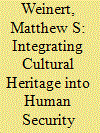

|
|
|
|
|
| Summary/Abstract |
The UN Development Programme introduced the human security concept in 1994 to address the diversity of challenges to people’s survival, livelihood, and dignity in seven key areas: personal, food, health, economic, political, community, and environmental security. A voluminous literature has since engaged its definitional parameters, theoretical implications, and practical applications. Yet neither dignity nor community security, defined in part to include cultural traditions and identities, have attracted much attention despite considerable human and community insecurities caused by assaults on cultural heritage which, as emblematic of distinctive cultural identities, have downward effects on dignity. This article aims to correct that gap. It identifies and examines three security markers to ascertain and redress the sufferance of indignities and insecurities pertaining to heritage, dignity, and community security: ensuring use of heritage; promoting its transmission; and protecting and advancing cultural rights.
|
|
|
|
|
|
|
|
|
|
|
|
|
|
|
|
| 5 |
ID:
149035
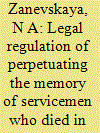

|
|
|
|
|
| Summary/Abstract |
The author examines special aspects of perpetuating the memory of servicemen who died in captivity, where they found themselves due to combat situation at hand.
|
|
|
|
|
|
|
|
|
|
|
|
|
|
|
|
| 6 |
ID:
141717
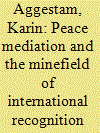

|
|
|
|
|
| Summary/Abstract |
This article analyzes the intricate dynamics between international mediation and the quest for recognition in protracted conflict. The overarching aim is two-fold: to analyze how the struggle for recognition relates to protracted conflict, and why, when and in what ways recognition poses a barrier to efficient peace diplomacy and mediation. The article explores how preferences and interests are infused with identity politics and claims for recognition. It advances three inter-related dimensions of recognition: ontological security, dignity and identity. The conceptual discussion utilizes empirical illustrations from the Israeli-Palestinian conflict. Three concluding remarks are made. First, international mediation may be accepted by negotiating parties to achieve international recognition rather than to reach an agreement. Second, due to the problem of recognition the notion of “ending conflict” can backfire in the mediation process. Third, mediators should focus on mutual, but thin recognition towards greater acknowledgement of the untenable and vulnerable positions the parties hold in conflict.
|
|
|
|
|
|
|
|
|
|
|
|
|
|
|
|
| 7 |
ID:
128169
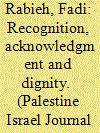

|
|
|
|
|
| Publication |
2012.
|
| Summary/Abstract |
We have no choice but to learn how to coexist and share this land; we cannot defeat each other militarily and that each nation is here to stay.
|
|
|
|
|
|
|
|
|
|
|
|
|
|
|
|
|
|
|
|
|